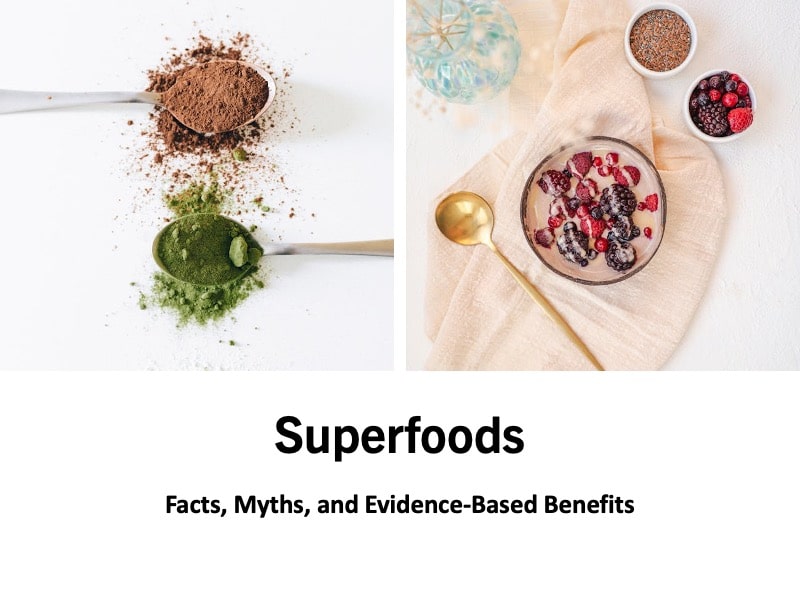Superfoods: Facts, Myths, and Evidence-Based Benefits
Superfoods have taken the health and wellness industry by storm, frequently touted as nature’s most powerful foods capable of enhancing longevity, boosting immunity, and even preventing chronic diseases.
From vibrant berries and leafy greens to exotic seeds and ancient grains, these nutrient-dense foods have been marketed as essential for optimal health.
However, despite their popularity, there is no standardized scientific definition for what truly qualifies a food as “super.”
Many superfoods earn their reputation due to their high concentrations of vitamins, minerals, antioxidants, healthy fats, or bioactive compounds, which may contribute to better health outcomes.
Studies have shown that certain superfoods can support heart health, brain function, metabolism, and even athletic performance.
However, the notion that eating a handful of “super” ingredients alone will drastically transform your health is misleading.
A 2023 study published in Foods examined how superfoods are portrayed online and found that while much of the information was accurate, it was often oversimplified, creating unrealistic expectations for consumers (Cobos & Díaz, 2023).
In reality, no single food can act as a magic bullet for health—true wellness comes from an overall balanced diet and lifestyle.
With the rise of superfood powders, which promise all the benefits of whole foods in a convenient, concentrated form, the debate over their effectiveness has intensified.
- Do these powders hold up to their claims?
- Or are they simply another wellness trend?
Understanding the science behind superfoods—and how they compare to their powdered counterparts—can help separate fact from fiction.
What Are Superfoods?

The term “superfoods” is a marketing concept rather than a scientific classification. It generally refers to nutrient-dense whole foods that provide an exceptionally high concentration of vitamins, minerals, antioxidants, and bioactive compounds that support overall health and well-being.
Unlike everyday foods, superfoods are often recognized for their unique ability to enhance bodily functions, reduce inflammation, and potentially lower the risk of chronic diseases when consumed as part of a balanced diet.
However, a study published in Foods (2023) found that many websites oversimplify the health claims associated with superfoods, sometimes raising false expectations for consumers (Cobos & Díaz, 2023).
Although there is no scientifically standardized definition, superfoods typically include fruits, vegetables, seeds, nuts, legumes, fermented foods, and certain proteins that offer an extraordinary nutritional profile compared to other foods.
What sets them apart is not just their nutrient content but also their synergy—many superfoods contain powerful combinations of polyphenols, omega-3 fatty acids, fiber, probiotics, or essential amino acids, which work together to optimize health.
However, while superfoods can be valuable additions to a nutritious diet, they are not miracle cures.
Their benefits are most effective when integrated into a diverse, whole-food-based diet rather than being relied on as a singular solution for health and longevity.
Top 10 Superfoods Based on Scientific Research
While numerous foods are labeled as superfoods, some have more scientific backing than others.
A study analyzing online sources found that kale, spinach, salmon, blueberries, avocado, chia seeds, walnuts, beans, fermented dairy, and garlic were the most frequently mentioned superfoods (Foods, 2023).
Kale & Spinach
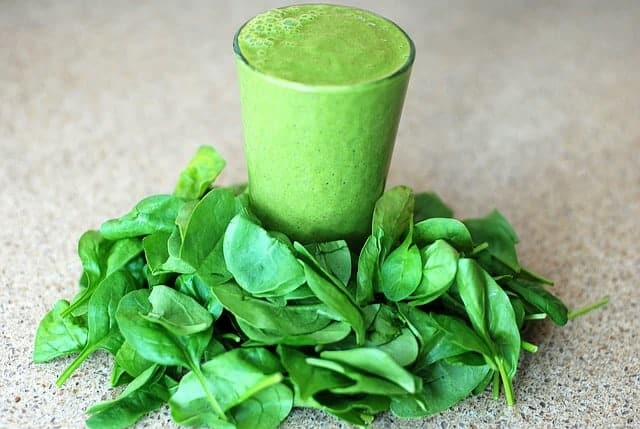
High in vitamins A, C, and K, as well as powerful antioxidants, kale and spinach support immune function, bone health, and eye health.
They also contain lutein and zeaxanthin, two carotenoids that help protect against age-related macular degeneration and reduce oxidative stress in the body.
Salmon
Rich in omega-3 fatty acids EPA and DHA, salmon helps reduce inflammation, support cognitive function, and lower the risk of heart disease.
Additionally, it provides high-quality protein, B vitamins, and selenium, all of which contribute to muscle repair, energy metabolism, and immune system strength.
Blueberries

Packed with anthocyanins, flavonoids, and other antioxidants, blueberries help reduce inflammation and improve cognition.
Research suggests that regular consumption of blueberries may support brain function, delay age-related cognitive decline, and enhance cardiovascular health by improving blood vessel function.
Avocado
Avocados provide healthy monounsaturated fats, fiber, and essential vitamins that support heart health, brain function, and skin hydration.
Avocados are also a natural source of potassium, which helps regulate blood pressure and maintain muscle and nerve function.
Chia Seeds
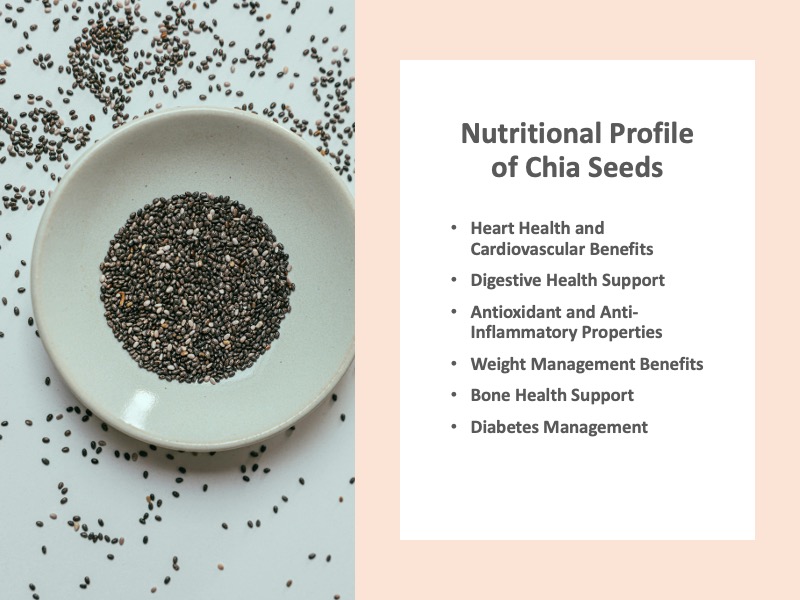
Chia seeds are an excellent source of fiber, protein, and plant-based omega-3 fatty acids (ALA), which support heart health and reduce inflammation.
These tiny seeds absorb liquid and form a gel-like consistency, which aids in digestion, promotes hydration, and may help regulate blood sugar levels.
Walnuts
Rich in polyunsaturated fats, plant-based omega-3s, and antioxidants, walnuts support brain function and may reduce the risk of neurodegenerative diseases.
They also contain ellagitannins, compounds that promote gut health by supporting beneficial gut bacteria and producing anti-inflammatory metabolites.
Beans
High in plant-based protein, fiber, and resistant starch, beans help regulate blood sugar, support gut health, and improve digestion.
They also contain iron, folate, and magnesium, which are essential for energy production and cardiovascular function.
Fermented Dairy (e.g., yogurt, kefir)
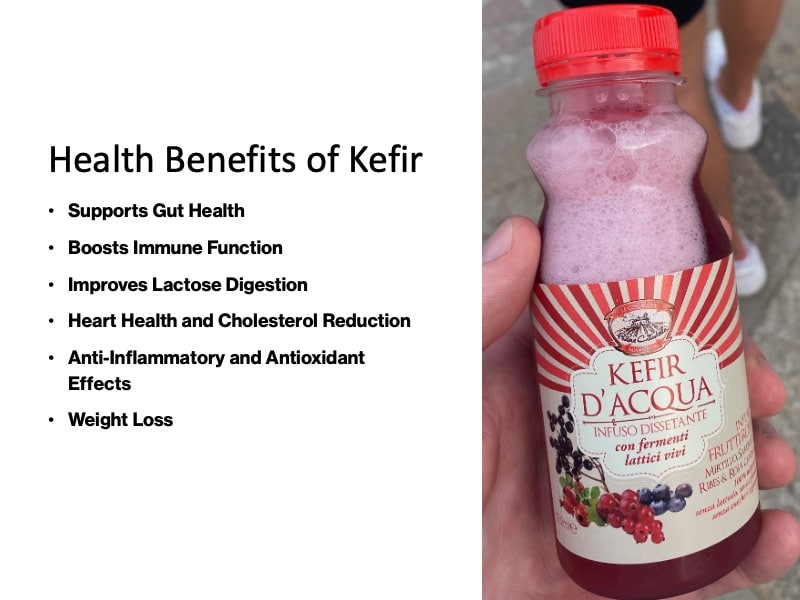
Fermented dairy products like yogurt and kefir contain probiotics, which support gut microbiome balance, enhance digestion, and boost immune health.
Fermented dairy products also provide calcium, vitamin D, and bioactive peptides, which contribute to bone strength and metabolic function.
Garlic
Exhibits antibacterial, antiviral, and cardiovascular benefits due to its allicin content, a sulfur compound that supports immune function, improves blood circulation, and helps lower blood pressure.
Studies suggest that garlic may also aid in detoxification by enhancing liver function and reducing oxidative stress.
Flaxseeds
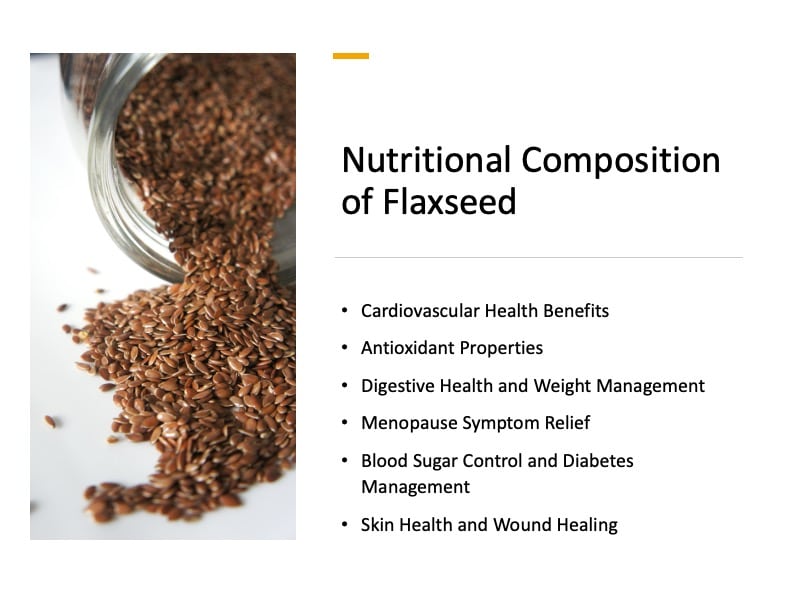
Research suggests that flaxseeds enhance gut health, improve cholesterol levels, and support metabolic function (Barsby et al., 2021).
Flaxseeds are also one of the richest sources of lignans, plant compounds with antioxidant and estrogenic properties that may help protect against hormone-related cancers and support hormonal balance.
Superfoods and Immunity: Separating Myths from Facts
The COVID-19 pandemic accelerated the demand for immune-boosting foods, including superfoods.
A review published in Critical Reviews in Food Science and Nutrition (2024) found that while some superfoods (e.g., green tea, pomegranates, nuts, and raw honey) contain bioactive compounds that support immune health, scientific publications on their direct disease-prevention properties remain limited.
Researchers emphasized the need for further studies to distinguish evidence-based benefits from marketing hype (Hassoun et al., 2024).
Do Superfoods Really Prevent Disease?
One of the most debated topics is whether superfoods can prevent chronic diseases like diabetes, metabolic syndrome, and cardiovascular disease.
A systematic review of human intervention trials assessed the impact of superfoods on metabolic syndrome risk factors. While foods like blueberries, flaxseeds, and garlic showed potential benefits, the evidence was inconsistent due to variations in study duration and dosages (van den Driessche et al., 2018).
Similarly, a narrative review on superfoods for Type 2 Diabetes highlighted that polyphenol-rich foods (such as berries), fermented dairy, and whole grains might aid glycemic control and reduce HbA1c levels.
However, researchers cautioned that superfoods should complement a healthy diet and exercise plan rather than serve as a standalone solution (Pires, 2023).
The Truth About Superfood Supplements

Superfood supplements—such as powders and capsules—are widely available, but are they as effective as whole foods?
Although superfood supplements have their place and can provide additional benefits, when you compare whole foods vs supplements, whole foods almost always win.
A study in PeerJ (2021) examined superfood extracts from chia, flax, sunflower, and hemp seeds.
It found that while the extracts contained beneficial nutrients and antioxidants, their impact on cell health was complex, suggesting that whole foods might provide more synergistic health benefits than isolated extracts (Barsby et al., 2021).
Superfood Powders vs. Whole Superfoods: Key Differences
Superfood powders are made by dehydrating and pulverizing whole foods into a concentrated form.
While superfood powders provide a convenient alternative, they should not replace whole foods, especially for fiber intake and satiety.
| Factor | Whole Superfoods | Superfood Powders |
|---|---|---|
| Nutrient Profile | Retains all fiber, vitamins, and natural hydration | May lose some fiber and heat-sensitive vitamins |
| Antioxidants | Naturally present and synergistic | Concentrated, but may degrade in processing |
| Digestibility | Whole, raw form requires digestion | Easily absorbed due to fine powder form |
| Convenience | Requires meal prep and fresh storage | Quick to mix into smoothies or drinks |
| Shelf Life | Short (fresh produce expires quickly) | Long shelf life, stored as powder |
Are Superfood Powders Good for You?
Superfood powders can be beneficial when used correctly.
A study in PeerJ (2021) found that extracts from chia, flax, and sunflower seeds retained essential minerals and antioxidants, but the health benefits were not as strong as consuming whole seeds (Barsby et al., 2021).
While powders provide a concentrated nutrient boost, they lack water content and fiber, which are essential for digestion, gut health, and satiety.
Do Superfood Powders Work?
The effectiveness of superfood powders depends on their ingredients and processing.
Research shows that powders made from whole, organic, and freeze-dried ingredients retain more nutrients than those that use heat processing.
A systematic review in Food & Function (2018) found that whole superfoods like blueberries, flaxseeds, and garlic showed potential benefits for metabolic syndrome, but evidence for their powdered counterparts was limited due to inconsistent dosages and formulations (van den Driessche et al., 2018).
How to Ensure Your Superfood Powder Works
- Check the ingredient list – Look for whole-food-based powders without artificial additives.
- Choose freeze-dried over heat-processed powders – Freeze-drying preserves more nutrients.
- Look for organic certification – Reduces exposure to pesticides.
- Be mindful of added sweeteners and fillers – Some powders contain sugar, maltodextrin, or artificial flavors.
Are Superfood Powders Worth It?
Superfood powders can be worth it for those who struggle to eat enough fruits and vegetables or want an on-the-go nutrition boost.
However, they should not replace whole superfoods entirely.
A study in Medicina (2023) found that whole superfoods like fermented dairy and polyphenol-rich foods (e.g., berries) significantly improved glycemic control in Type 2 Diabetes patients. However, there was limited research on superfood powders producing the same effects (Pires, 2023).
When Superfood Powders Are Worth It
- For busy individuals who need a quick nutrition boost.
- As a supplement when whole foods are not easily accessible.
- For athletes needing concentrated nutrition for recovery.
When Whole Superfoods Are Better
- For gut health and digestion (due to fiber content).
- For satiety and weight loss (whole foods keep you fuller longer).
- For maximum antioxidant benefits (synergistic compounds work better in whole foods).
Do Superfood Powders Help With Weight Loss?

Superfood powders can play a supportive role in weight loss when combined with a balanced diet and active lifestyle, but they are not a magic solution for shedding pounds.
Some ingredients commonly found in superfood powders—such as green tea extract, pomegranate, and fiber-rich seeds—have been shown to enhance metabolism, fat oxidation, and appetite regulation.
A 2024 review published in Critical Reviews in Food Science & Nutrition found that these compounds may contribute to weight management by increasing energy expenditure and reducing fat accumulation (Hassoun et al., 2024).
However, relying solely on superfood powders for weight loss is not as effective as consuming whole, fiber-rich foods.
Whole foods provide bulk and satiety, helping to naturally regulate appetite and prevent overeating.
Fiber is especially crucial in this process, as it slows digestion and stabilizes blood sugar levels—benefits that many superfood powders lack due to fiber loss during processing.
For those looking to incorporate superfood powders into a weight-loss-friendly routine, the best options are those that are minimally processed, free from artificial additives, and rich in natural fiber and antioxidants.
Powders that contain organic greens, plant-based proteins, fiber from flax or chia seeds, and metabolism-boosting compounds like matcha or turmeric are more beneficial than those loaded with sweeteners, fillers, or synthetic ingredients.
Best Superfood Powders for Weight Loss
- Greens Powders (Spirulina, Wheatgrass, Chlorella) – Rich in chlorophyll, antioxidants, and micronutrients.
- Protein + Superfood Blends (Hemp, Pea, or Pumpkin Protein) – Provides plant-based protein with added superfoods.
- Berry-Based Powders (Acai, Blueberry, Pomegranate) – High in polyphenols and vitamin C.
- Adaptogenic Superfood Blends (Maca, Ashwagandha, Reishi Mushroom) – Supports stress reduction and energy.
- Collagen + Superfood Powders – Combines collagen peptides with greens or antioxidant-rich fruits.
- Fiber-rich powders (chia, flax, psyllium husk) – Supports digestion and appetite control.
- Matcha or green tea powder – Contains catechins that boost metabolism.
Will Superfood Powders Actually Make You Healthier?
Superfood powders can contribute to better nutrition, but they are not a magic bullet. The key to optimal health is an overall diet rich in whole foods.
While superfood powders provide convenience, they cannot fully replace the benefits of whole superfoods. Whole foods contain natural fiber, water, and synergistic compounds that enhance nutrient absorption and satiety.
However, if you need a quick nutrition boost, a high-quality superfood powder can be a useful addition to your diet—just make sure it’s made from whole, organic ingredients with no unnecessary fillers.
Would you like to refine specific sections further or optimize for a specific audience, such as athletes, busy professionals, or weight loss seekers?
- If you struggle to eat enough fruits and vegetables, superfood powders can be a useful supplement.
- If you already consume a balanced diet, superfood powders may not add much additional benefit.
Should You Use Superfood Powders?
- Use them as a supplement, not a replacement.
- Prioritize whole superfoods for fiber, hydration, and maximum nutrients.
- Look for high-quality, organic, and minimally processed powders.
Are Superfoods Overhyped?
While superfoods can play a valuable role in a healthy diet, experts warn against relying on them as miracle cures.
According to the Foods (2023) study, most online sources provide accurate but oversimplified information about superfoods.
Websites often fail to clarify that no single food can drastically improve health—rather, a balanced diet and an overall healthy lifestyle are key (Cobos & Díaz, 2023).
Moreover, while superfoods can enhance nutrient intake, they are not a substitute for medical treatment or a well-rounded diet.
As I’ve mentioned and researchers have pointed out, nutrient-rich whole foods should be prioritized over dietary supplements, except in cases of specific deficiencies (Lentjes, 2019).
How to Incorporate Superfoods Into Your Diet
Incorporating superfoods into your daily meals doesn’t have to be complicated. Here are simple ways to include them in a balanced diet:
- Smoothies: Add blueberries, flaxseeds, or chia seeds to boost fiber and antioxidants.
- Salads: Toss in spinach, kale, walnuts, or avocado for a nutrient-packed meal.
- Breakfast: Top oatmeal with flaxseeds, berries, and a spoonful of yogurt for gut-friendly benefits.
- Snacks: Munch on a handful of nuts or roasted chickpeas for protein and healthy fats.
- Main Meals: Incorporate salmon, beans, or quinoa as protein sources in lunch and dinner.
Best Superfood Power Supplements
Below are two top-rated superfood powders that I believe stand out due to their ingredient quality, health benefits, and effectiveness.
Bloom Greens & Superfoods
Bloom Greens & Superfoods is a nutrient-rich greens powder designed to support digestion, energy, and overall wellness.
It contains a blend of superfoods, probiotics, fiber, digestive enzymes, and adaptogens.
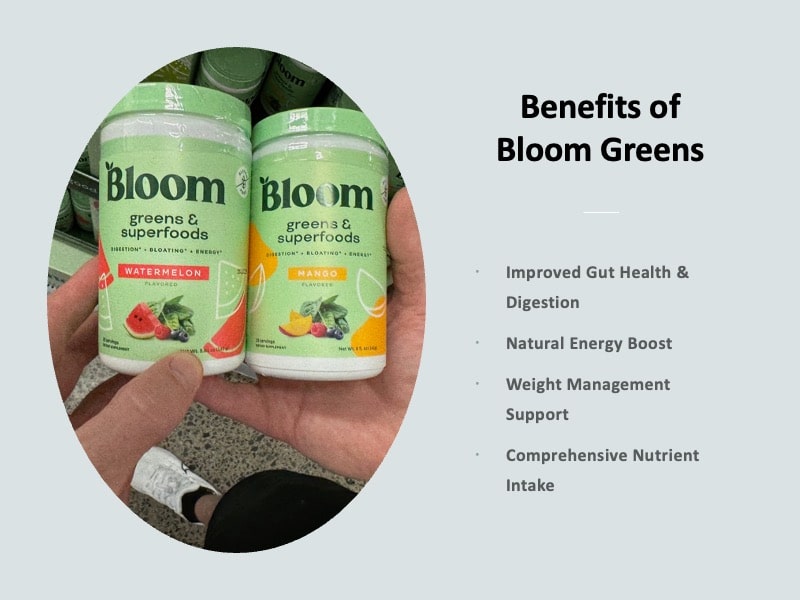
- Key ingredients include spirulina, chlorella, barley grass, and wheatgrass for micronutrient support.
- The probiotic blend contains Lactobacillus acidophilus and Bifidobacterium bifidum to promote gut health, while the fiber blend with flaxseed, chicory root, and apple fruit powder aids digestion.
- Additional ingredients like cranberries, elderberries, and acai provide antioxidants, and the adaptogen mix, including ashwagandha and Rhodiola, supports stress management.
After incorporating Bloom Greens into my routine, I noticed improvements in digestion, energy levels, and overall well-being.
The combination of probiotics, fiber, and digestive enzymes helped reduce bloating, while the greens and adaptogens provided sustained energy.
It is best suited for those looking for a well-rounded greens powder with a focus on gut health, micronutrient support, and natural energy.
Last update on 2025-07-12 / This article includes affiliate links/Images via Amazon Product Advertising API. I may earn commissions on purchases made through these links.
BIOHM Super Greens with Probiotics
BIOHM Super Greens with Probiotics is formulated to optimize digestion and gut health while providing essential greens and antioxidants.
What sets it apart is its blend of probiotics, prebiotics, and digestive enzymes designed to balance both bacteria and fungi in the gut.
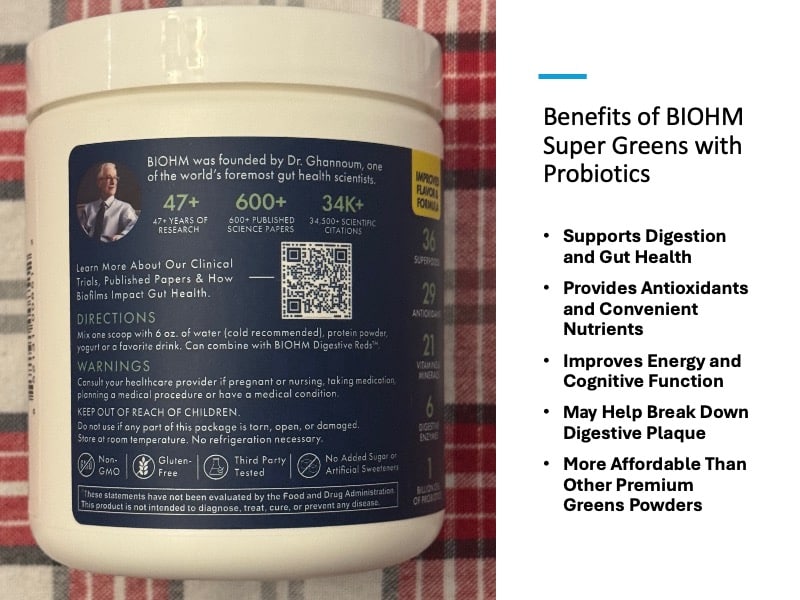
- The formula includes barley grass, wheatgrass, spinach, kale, broccoli, chlorella, and peppermint for micronutrient and antioxidant support.
- The probiotic blend contains Lactobacillus rhamnosus, Lactobacillus acidophilus, and Saccharomyces boulardii to aid digestion and reduce bloating.
- Additional ingredients like ashwagandha and lion’s mane support cognitive function and stress resilience.
After using BIOHM Super Greens, I noticed improved digestion, reduced bloating, and better gut regularity. It is a great option for those prioritizing gut health and looking for a budget-friendly superfood powder with a strong probiotic and prebiotic blend.
Last update on 2025-07-12 / This article includes affiliate links/Images via Amazon Product Advertising API. I may earn commissions on purchases made through these links.
Vital Proteins Daily Greens
Vital Proteins Daily Greens is a convenient and versatile greens powder that fits well into a well-rounded wellness routine.
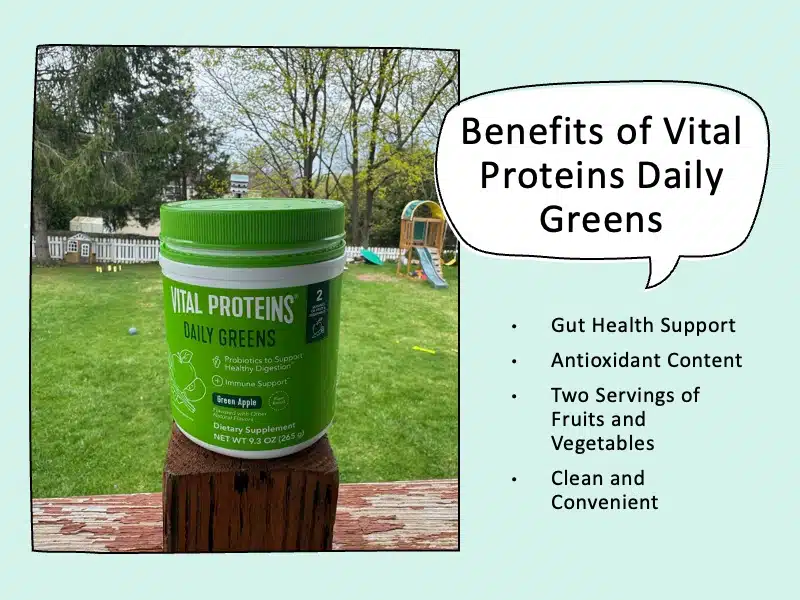
While it’s not my top pick, I still consider it one of the best superfood supplements for individuals looking to increase their daily intake of organic greens, antioxidants, and micronutrients.
This formula supports hydration, detoxification, and overall health, especially when paired with other Vital Proteins supplements like Vital Proteins collagen peptides.
Its mild taste makes it easy to mix into smoothies or water, and it is ideal for those who are new to green powders or prefer a less intense flavor profile.
Last update on 2025-07-12 / This article includes affiliate links/Images via Amazon Product Advertising API. I may earn commissions on purchases made through these links.
Final Thoughts: Are Superfoods Worth It?
Superfoods offer valuable nutrients and bioactive compounds, but their benefits should be seen within the context of an overall healthy diet.
The scientific evidence supports the idea that many so-called superfoods contribute to disease prevention and overall well-being, but no single food will provide a magic bullet for health.
Instead of focusing solely on superfoods, a diverse diet rich in whole, minimally processed foods will have the greatest long-term health benefits.
Superfoods are best enjoyed as part of a well-rounded lifestyle that includes exercise, hydration, and mindful eating.
This website does not provide medical advice. This website site does contain affiliate links, and purchases may earn a commission.
Read my Medical Disclaimer, Review Disclaimer, and Publishing Policies for more details. Use of this site indicates acceptance of these terms.

